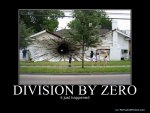Ryanm
Well-known member
- Joined
- May 9, 2012
- Messages
- 642
- Reaction score
- 202
- Gender
- Male
- Political Leaning
- Other
I have decided that dividing by zero is not actually impossible, but it just has no defined answer.
If ...
1 / 1 = 1
1 / 0.5 = 2
1 / 0.25 =4
1 / 0.125 =8
...
1/ 0.000005 = 200,000
1/ 0.0000000000001 = 10,000,000,000,000
As the denominator approaches zero the answer approaches infinity. Therefore...
1/0 = infinity
For example if an object has a force applied to it Force = Mass x Acceleration >>> Newton-meters = KG x m/s^2
How much force is applied if F = 10Kg x (5m/s / 0 seconds) ?
5/0 is infinity. Infinity x 10 = Infinity. Force would be equal to infinity, which is why it is impossible to have an object change velocities instantaneously, and because it would take an infinite amount of force which isn't actually possible.
So the next time someone says you can't divide by zero, just correct them and say, "yes you can; the answer is infinity."
So as in the force example. Saying you want to put matter into a container that has a volume of zero is akin to saying you want to put an infinite amount of matter into a container with a finite volume.
If ...
1 / 1 = 1
1 / 0.5 = 2
1 / 0.25 =4
1 / 0.125 =8
...
1/ 0.000005 = 200,000
1/ 0.0000000000001 = 10,000,000,000,000
As the denominator approaches zero the answer approaches infinity. Therefore...
1/0 = infinity
For example if an object has a force applied to it Force = Mass x Acceleration >>> Newton-meters = KG x m/s^2
How much force is applied if F = 10Kg x (5m/s / 0 seconds) ?
5/0 is infinity. Infinity x 10 = Infinity. Force would be equal to infinity, which is why it is impossible to have an object change velocities instantaneously, and because it would take an infinite amount of force which isn't actually possible.
So the next time someone says you can't divide by zero, just correct them and say, "yes you can; the answer is infinity."
So as in the force example. Saying you want to put matter into a container that has a volume of zero is akin to saying you want to put an infinite amount of matter into a container with a finite volume.


